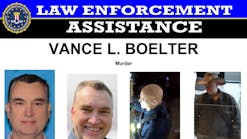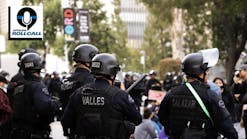On a recent visit to Atlantic City, NJ, (this time for pleasure rather than business) I had an opportunity to speak with one of Atlantic City's finest. Actually it was more like he initiated the contact... I was taking some photos of the Public Safety Building and of a marked unit parked in front. I enjoy photography and take dozens of photos wherever I go, some of which I use to accompany articles that I write. The officer became somewhat curious; alright he was a little nervous and tense seeing someone with a camera taking photos. He braced me, wanting to know what I was doing. After assuaging any trepidation that he may have had about who I was and what I was doing, we had a chance to talk about technology in police cars.
After looking inside one of their vehicles, I was quick to point out the conspicuous absence of any 21st Century technology. I pointed this out to my new found friend, asking him why none of the usual accoutrements normally found in cop cars today were missing. He answered in one word, "money." He said that dash cams, laptops, etc., have been a contentious topic between the department and City Council, the latter always spending tax dollars on "pet projects." The officer said that he and his colleagues would love to have those items, but at this point in time they are happy with just getting a couple of new vehicles every other year. That was the genesis for a discussion about the relative merits of having all of that stuff in the vehicle in the first place.
For those departments that are progressive enough and have the resources to purchase the latest in police equipment, a contemporary police vehicle might contain some or all of the following accessories: video camera on dash with full VCR player/recorder in trunk (microphone is carried on the officer); radar unit; laptop computer terminal; local police radio for calls within the city; emergency police radio for calls between adjacent departments/agencies; lights and siren - some control panels also have a device that will cause an upcoming traffic light to change to green for safer emergency travel; cell phone; duty bag; emergency lights mounted inside, which are in addition to overheads to provide better visibility; rifle rack; and finally a "good time radio" to listen to commercial broadcasts.
Now stop and think about what it takes to operate all of this equipment while driving to a dispatched assignment or just being on patrol, and it begs the question, "How does an officer still work the street while having to pay attention to all the 'Star Wars' stuff?" Moreover, how do we pay attention to our driving skills while trying to operate or read the computer terminal? How do we safely operate the radio, lights and siren? The answer is with one hand which is not how we were taught to safely operate our emergency vehicle. But more importantly, how does an officer really get to know the street, in terms of being able to see and hear what's going on around him? Does he have the good sense to do what we used to do years ago before much of this paraphernalia was around? Do any officers just get out of the vehicle and walk, talk, and listen to the neighborhood that they are working?
I know this is not popular anymore, but getting out of the car leads to some of the best police work that you will ever do. Meeting and talking with folks in the area where you work allows you to really get to know them as well as the problems that are associated with where they live. Interacting with people, winning them over, letting them get to know and speak with a cop, is the fundamental building block for establishing informants. Ask any investigator worth his salt, and he will tell you that the quickest way to solve a crime is through informants. Having a stable of folks that are willing to give you information about who the bad guys are, and where and who they hang with, beats sitting in front of a computer any day trying to solve a crime. Not only that, but it saves a lot of legwork that it would normally take to canvass neighborhoods.
So while my friend bemoaned the fact that his department lacked much of the modern gear that others had, he was quick to point out that he and his colleagues were definitely "street cops." They spent considerable amounts of time out of their vehicles exploring alleys, buildings, etc., looking for thugs and other miscreants. Would he like to have those big ticket items in their patrol cars? Yes, but right now he gets lots of face time with the people that he has sworn to protect. He and his cohorts continue to get the job done each shift, and pride themselves on "keeping it real."
Stay safe brothers and sisters!


